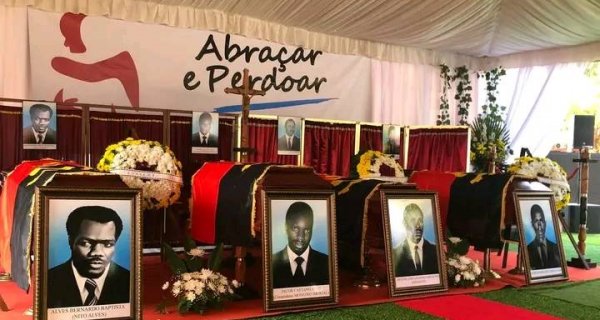In a statement to which Lusa had access, the associations M27 (orphans), Grupo de Sobreviventes do 27 de Maio de 1977 and Associação 27 de Maio (survivors and families of victims), which are part of the 27th of May Platform, warn of the fact that internationally accepted procedures for the identification of mortal remains were not being followed, following a report published on Televisão Popular de Angola (TPA).
Aired last Saturday, the report reports on the discovery of three mass graves in Huambo, which may contain the bodies of 90 victims, identifying some names of figures linked to the MPLA (party in power since the country's independence in 1975).
The report also highlights the efforts of the Commission for the Implementation of the Reconciliation Plan in Memory of the Victims of Political Conflicts (Civicop) and the executive in searching for the remains, without alluding to the alleged executors.
On May 27, 1977, an alleged attempted coup d'état, apparently led by Nito Alves – Minister of Internal Administration since independence (November 11, 1975) until October 1976 – was violently repressed by order of the President, Agostinho Neto, resulting in the execution of thousands of people.
The 27 de Maio Platform highlights that Angola does not have the "DNA in bones" technology that allows it to match genetic material provided by family members and criticizes that families are "separated from the process", contradicting institutional norms on the matter.
The statement highlights that, previously, Civicop accepted the collaboration of a team led by Portuguese forensic specialist Duarte Nuno Vieira, who concluded that the bones allegedly belonging to José Van Dunem, Sita Valles, Rui Coelho and other leaders had no connection to them, leading family members to denounce the handover of the remains as "an exercise in cruelty".
Civicop, they accuse, "maintains the option of make-believe, hoax and propaganda, with the participation of governors, traditional authorities and others being regrettable, as well as the disrespect for the feelings of the families of the Huambo victims, who were not provided with prior information".
Plataforma 27 de Maio denounced the "Civicop propaganda campaign" and called for the "implementation of internationally accepted procedures, as well as the creation of a genuine Truth Commission, which contributes to effective National Reconciliation".
He also requested the public presentation of the "DNA in bones" test certificates and the collaboration of independent and international experts as Angola does not have the "DNA in bones" extraction technology that allows bodies to be identified.
Civicop was also accused of violating the principles that were at its origins by UNITA – the main opposition party that fought an almost three-decade war against government forces – which disassociated itself from this entity in December last year, following reports aired by TPA that showed excavations of graves in Jamba, former UNITA territory.
In the two-year period following the alleged coup d'état of May 27, 1977, known as "fractionism" and which many describe as an internal struggle between factions of the MPLA ("nitistas", supporters of Nito Alves, and "netistas", by Agostinho Neto) thousands of people were arrested, tortured and killed.
Six days earlier, the Popular Movement for the Liberation of Angola (MLPA) had expelled Nito Alves from the party, leading the former minister and several supporters to invade the Luanda prison to free other supporters, while simultaneously taking control of the national radio station.
Troops loyal to Agostinho Neto, with the support of Cuban military personnel, ended up reestablishing order and arrested the rebels, following what became known as a "purge", which aimed to eliminate one of the factions, with approximately 30 thousand people, according to Amnesty International, most of them without any connection to Nito Alves,
In 2019, the President, João Lourenço, created Civicop, in charge of the general plan to pay tribute to the victims of the political conflicts, which occurred in Angola between November 11, 1975 and April 4, 2022, and two years later he apologized to the families, on behalf of the State.







